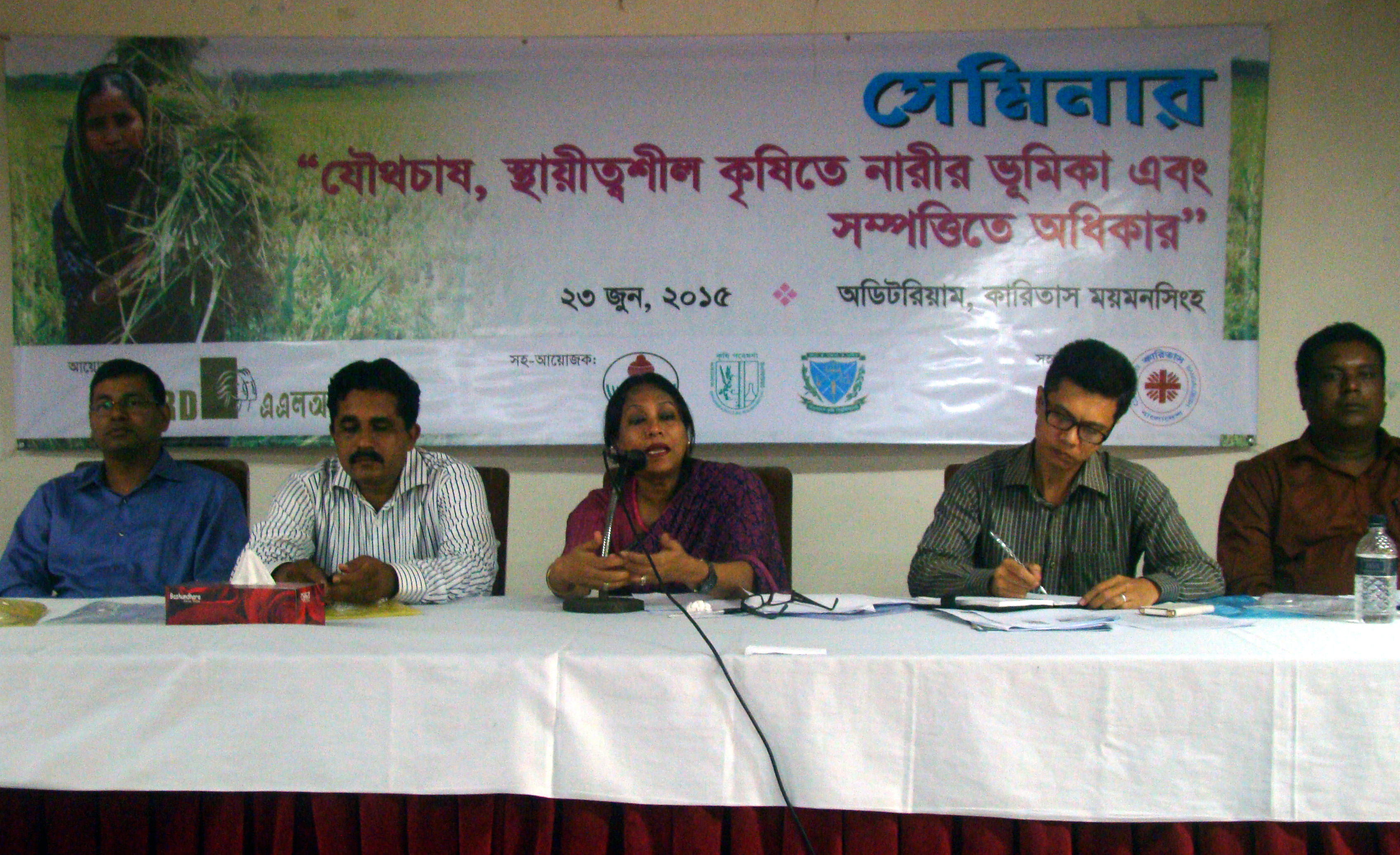Seminar: Collective Farming, Role of Women in Sustainable Agriculture and Right to Land, 23 June 2015, @ Mymensingh District.
About 88% of the works in agriculture sector traditionally goes to women whereas 96% of the private land in Bangladesh is owned by male and 4% of the land only women owned- said the discussants in a seminar held at Caritas auditorium, Mymensingh. ALRD in association with Bangladesh Agricultural Research Institute (BARI), Bangladesh Agricultural University, Bangladesh Organic Agricultural Network (BOAN) and partner organizations Gram Unnoyon Sangstha [Village Development Organization] (GRAUS) and Caritas organized the seminar at Mymensingh on “Collective Farming, Role of Women in Sustainable Agriculture and Right to Land”.
The seminar aimed to discuss an ILC supported research on "Assessing Inheritance Laws & their Impact on Rural Women in Bangladesh” linked with women’s significant role in the food production and sustainable agriculture though women have no recognition as farmer as well as they also deprived from land ownership rights, particularly in inheritance in rural Bangladesh; building linkages with the GOs, NGOs and other institutions would be helpful for the local women producer in organic farming; and unified effort is essential to raise the campaign on women legal recognition as farmer so that they can get access to agricultural land, institutional credit, new technologies and government programs.
Three keynote papers were presented in the seminar respectively by Shanjida Khan Ripa, Asst. Programme Coordinator, ALRD on “Women’s role in Agriculture and Right to Land: Perspectives Inheritance Rights”; Dr. Nazim Uddin, Senior Scientific Officer, BARI on “Women in Collective Farming and Sustainable Development of Agriculture”; and Dr. Ashraful Islam, Associate Professor, Horticulture, Bangladesh Agricultural University, on “Women’s role in Sustainable Agriculture and Food Security”. The panel discussants were Apurba Mrong, Regional Director of Caritas-Mymensingh; and Mr. Sayeduzzaman Khokon, Executive Director of Gram Unnoyon Sangstha. The seminar presided over by the Rowshan Jahan Moni, Deputy-Executive Director of ALRD.
Local representatives from different professional organizations, NGOs, journalists, lawyers and male and female farmers participated in the seminar. Total 110 participants including 60 women attended the seminar.
Shanjida Khan Ripa, in her presentation put emphasis on women contribution in agricultural sector and in reality women’s rights are virtually overlooked by the country’s law of inheritance, socio-political and cultural construct. She also said that if family purchases a land, a woman has no legal rights of ownership unless her name appears on the deed. In De facto the real situation women cultivators and agriculture laborers perform about 88% of all the agriculture activities – yet their valuable contribution is ignored and they are not acknowledged as farmers. Women are keeping lagging behind while they consist half of the country’s population. In De jure inheritance law in Bangladesh is complex are formulated mainly on the basis of religious doctrines- known as personal laws.
She called for actions from the development organizations on raising unified voice for women access to land; women recognition as farmer. She suggested that the government should formulate a comprehensive approach on tenurial security for women farmer; promotion of group approach or women cooperative; access to credit from govt. institution for small women cooperative; Women access to land, water, and natural resource.
Dr. Nazim Uddin mentioned in his presentation give importance on collective farming; sustainable agriculture, and organic farming where women play a vital role. He said since ancient time in Stone Age Drabira community was matrilineal society and their women led the hunting team and also they collected and preserved seeds, crops. When the plow came as agricultural tools materials it snatched the capability of women in agricultural sector.
He also said as the technology is the blessing of food production has created division among the empowerment of male and female in society. Women lost her leadership in agricultural due to the gradual changes of states economic and cultural practices. Nowadays, women are not visible in marketing and sales of their production, male are more visible and control the market and capital. Women best practices the seven crucial parts of the sustainable agriculture. Use of pesticides and chemicals in the agricultural field caused extinction of many species including fishes, birds, and useful insects. He recommended going for organic farming to protect the biodiversity, water management, soil fertility etc. and form a seed bank.
Dr. Ashraful Islam recommended facilitating our women for the agricultural work and link women farmers to high value chains to make our country hunger and poverty free, and ensure nutritional food security. Thus it needs political commitment and different agencies of GOs such as Department of Agricultural Extension (DAE), NGOs, and institutions work together. He said, Women play a vital role in agriculture and food security. Women also are more likely than men to spend their income on the well-being of their families. He added, women protect the four components of food security such as Avaialability, access, utilization and stability.
During the suming up of the seminar the Chair Rowshan Jahan Moni said, ”as in the discussion came up the women are viable in sustainable agriculture, they hold the collective farming and organic farming so that the women will bring into the mainstream. The government has largely to do it by using its all agencies. Day by day female headed family is increased by rural out of migration in and abroad of male family members. It is saying that farming is going into the hands of women, but all the government facilities are not allowed for the women. These women are directly involved in the production, but they do not have the access to the productive resources. So the government will have to negotiate individually named of women in the distribution of khas land. To ensure the indigenous women's access to land the traditional laws of IPs should be recognized and need to be reformed.





